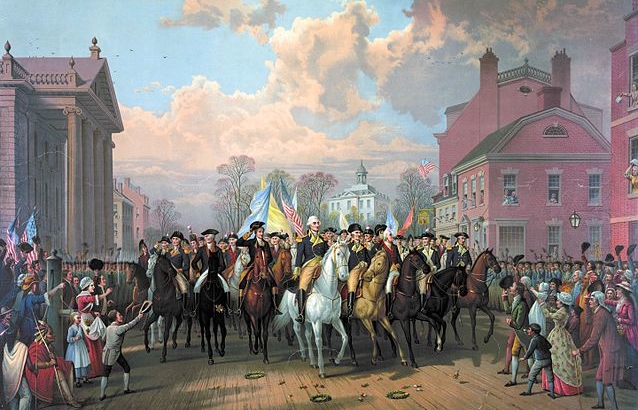Ou La Mort or Deliberation: The French Revolution and the American Revolution
The motto of the French Republic is Liberté, égalité, fraternité, meaning liberty, equality, brotherhood.
What’s not to like? Pass the baguettes and butter.
It is derived from the motto of the French Revolution, which has a little something extra: Liberté, égalité, fraternité ou la mort.
Now, wait a minute. That means liberty, equality, brotherhood or death.
The French Revolution distinguished itself in the final category of its motto. No sooner had the First Republic been created than an eruption of accusations of treason, anticlerical sentiment, massacres and public executions took place. Not satisfied to overturn the ruling caste that had governed from Versailles, and the chateaus and churches of France, the revolutionaries set about to kill them.
In France 1793, no less than 16,000 death sentences were handed down, and 10,000 were sent to prison to die there, in most cases without a trial. Ou la Mort became the Terror. Little explanation is needed as to why “ou la mort” is now gone from the national motto.
The United States took a very different path. That is not to say there were not hard feelings. When the fighting ended and the American Revolutionary War came to a close in 1783, some 70,000 loyalists were expatriated to Britain and the remaining North American British colonies in places like coastal Quebec Prince Edward Island, and Nova Scotia. But they were not killed.
They were not even really persecuted. Always hungry for people, as soon as the loyalists left, the United States made efforts to recruit them back, supposing their industry and connections, harnessed in a spirit of reconciliation, could aid the new nation in finding its feet.
So, we ask ourselves, what was the difference between the French Revolution and the American Revolution that one should culminate in a river of blood and another in practical reconciliation and a compact, the United States Constitution, which has remained the charter of the new nation for 250 years?
The first place to look is the Declaration of Independence. The principles of the Declaration had percolated in American thought for 100 years or more before their expression in that revolutionary document. As Calvin Coolidge noted in his famous July 4 speech,
“A very positive echo of what the Dutch had done in 1581, and what the English were preparing to do, appears in the assertion of the Rev. Thomas Hooker, of Connecticut, as early as 1638, when he said in a sermon before the General Court that—‘The foundation of authority is laid in the free consent of the people.’ ‘The choice of public magistrates belongs unto the people by God’s own allowance.’”
The American Revolution was rooted not in deduction from mere abstract principle but by a process of induction from a practice spanning several generations. No understanding of the principles of equality and rights to life, liberty and the pursuit of happiness could be easily twisted into a murderous rage as would happen in France.
We see this in the words of Federalist #1:
“It has been frequently remarked that it seems to have been reserved to the people of this country, by their conduct and example, to decide the important question, whether societies of men are really capable or not of establishing good government from reflection and choice, or whether they are forever destined to depend for their political constitutions on accident and force.”
The meaning of the abstract principles of the Declaration of Independence was universally understood to impose a requirement of deliberation, not execution of enemies, on the new government. It was so understood because that was the habit of the American people to think of it that way. They would no sooner leave the house without their pants than think to solve a political problem other than by organizing, deliberating and deciding by some method of majority rule.
The new Constitution which was to be adopted constituted a second appeal to necessity. The Articles of Confederation had been, truly, an abject failure. The country was unable to control debtor and creditor contests and its economy was moribund, a victim of both the violence of these disputes and the weakness of its central government.
However, the new nation chose not to turn upon itself and its various perceived internal enemies but to debate over a new Constitution, to be ratified by consent through a new ratification process, that was not contemplated by the Articles of Confederation, and in fact violated its express terms. In Federalist #40, Publius emphasizes the need to alter and abolish the dysfunctional government by a process of consent rather than force.
From this spirit, a new government was brought forth based on the notion of deliberation and consent, structured around mechanisms to harness the baser incentives of men to promote the habits of deliberative government.
When Benjamin Franklin identified the new form as “a republic, if you can keep it” he implied that the continual fostering and renewal of the habits of deliberative government was the spirit of the American Revolution and the essential ingredient for the continued success of the United States.
 J. Eric Wise is a partner in the law firm of Alston & Bird.
J. Eric Wise is a partner in the law firm of Alston & Bird.
Click here for American Exceptionalism Revealed 90-Day Study Schedule
Click here to receive our Daily 90-Day Study Essay emailed directly to your inbox

 https://en.wikipedia.org/wiki/American_Revolutionary_War#/media/File:Evacuation_Day_and_Washington's_Triumphal_Entry.jpg
https://en.wikipedia.org/wiki/American_Revolutionary_War#/media/File:Evacuation_Day_and_Washington's_Triumphal_Entry.jpg https://en.wikipedia.org/wiki/Edmund_Burke#/media/File:EdmundBurke1771.jpg
https://en.wikipedia.org/wiki/Edmund_Burke#/media/File:EdmundBurke1771.jpg
Join the discussion! Post your comments below.
Your feedback and insights are welcome.Feel free to contribute!